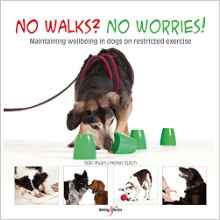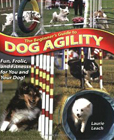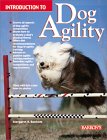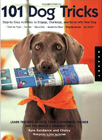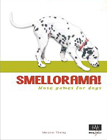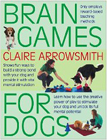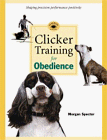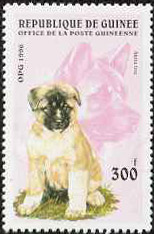Agility and training games
If you want to buy a book, clicking on the book cover will take you directly to that book on the Amazon.co.uk web site.
See also:

No walks? No worries! - Maintaining wellbeing for dogs on restricted exercise
This is a short book giving help to owners with dogs who can’t be as active as usual, perhaps after an operation, or an accident. Some of the advice is applicable to older dogs who can’t get about the way they used to. The introduction spells out the importance of walks, and the special experiences they bring that the convalescent will be missing. Chapter One helps owners to identify quirks that their dogs may have, that need to be taken into account in a care plan, such as a reluctance to be handled. Chapter Two follows on with preparation for a planned operation, for example, teaching dogs to greet humans without jumping up (not sensible after an operation), or to learn to wear a muzzle for examinations, if necessary. Chapter Three deals with providing for the physical needs of less-active dogs, such as tips on using non-slip mats, crates, and the benefits of hydrotherapy.
Read more: No walks? No worries! - Maintaining wellbeing for dogs on restricted exercise

Agility Training: The Fun Sport for All Dogs
This is a very useful reference book for people starting an agility club, or who want to try out agility with friends. There are clear instructions on how to 'do agility', as well as help with building your own course. The focus is also on enjoying the sport, rather than taking it in deadly earnest. Agility is such a useful way of training dogs, and learning to communicate with them by having fun, that it's refreshing to read a book that looks at the sport in terms of enjoyment. It's not really a book for people interested in competition agility, being quite basic on techniques, but it has lots of good ideas for people wanting to set up a club to be able to do something enjoyable with their dogs.

The Beginner's Guide to Dog Agility [Paperback]
This is what it says, a book for beginners who are interested in Dog Agility. It's clearly written and very well-illustrated. There´s an account on the history of the sport, and practical advice on setting up a course. Strengths: it's very clear, and would be an ideal present for older children. Weaknesses: if you are really into agility, you will want a more in-depth book. It´s also written for Americans, and some people may want to know more about the sport in the UK. This book is good value if you just want an introduction, or are trying to persuade a friend or a child to take up the sport.

Introduction to Dog Agility
Dog agility can be very enjoyable for both owners and dogs, and can help us learn how to communicate with our dogs, as well as helping to channel the energy of ‘hyper’ dogs into something constructive. So what if the collies tend to dominate agility classes and competitions, you can still do agility for fun, and Margaret Bonham shows you how. She covers all levels of agility activities, from setting up a course in your garden or a field, to competition events (for collie owners…). This book is an excellent introduction for beginners, since it's clearly written - accessible enough for older children. It is pretty basic, however, and experienced agility people are likely to want something meatier.

101 Dog Tricks: Step-by-step Activities to Engage, Challenge, and Bond with Your Dog
This book is especially useful for people with largish young, active dogs who want to channel and direct their energy. Yes, you can impress people with the 'tricks', but there's a lot of training involved too. The book allows you to move from easy to difficult tricks, and it's well illustrated, so it´s easy to follow. There are also activities that you can do together as a family. It can be a fun book for sensible children who have a good relationship with the family dog. On the plus side, this book makes training enjoyable, and the tricks can reassure nervous visitors that your dog is under control and adorable, despite being large and bouncy. Some of the suggestions do involve physical guidance, however, and if your dog is worried about being touched, it's worth working on building up trust through gentle massage and other pleasurable hands-on experiences, before trying on 'hands-on' guidance methods.

Playing With Your Dog [Paperback]
As this books claims, games help make dogs smarter, and help keep them fit and happy. Playing games with dogs also improves our relationships with them. We do fun activities together, and learn how to communicate better with one another. This book is a good starter for learning how to play with dogs. There are ideas for dogs of varying levels of fitness and ages, and you don't need to use special equipment to play the games. There's also an explanation of dog behaviour. On the plus side, the book is easy enough for older children to follow, and the stress on safety is especially appropriate for children, who sometimes take risks without realising it. The book is a bit short and basic, however, and experienced owners would probably prefer a more in-depth book with more ideas.

Smellorama! - Nose games for your dog
Smellorama! is a book that makes scent work accessible for most owners. It´s easy to follow, and well-illustrated. There are other more specialist books on scent work, this book on 'nose games' is geared to novice owners who are trying out the activities for fun. It´s pretty good for a pet owner´s guide, and has games with different levels of difficulty. Your dog may well learn some very useful skills, and surprise you by how much he can do. There´s also a lot in this book that helps to understand dogs better, for example how they try to give us information. On the plus side, this is a book that most pet dog owners will enjoy using, because dogs love to use their noses. However, people who want to take up scent work seriously really need to work with a trainer who has a good track record in the field they want to specialise in. It's too easy to teach dogs habits that can later cause problems if you try to go it alone. So, as a fun book for pet owners, Smellorama has great merit, but people aiming for serious scent work, need a more specialist book and a trainer.

Brain Games For Dogs
Brain Games For Dogs is great fun, with a lot of ideas for games with varying levels of difficulty. It's well illustrated and well written, so is easy to follow. The author, Claire Arrowsmith, is very experienced in working out what dogs are capable of, both mischief and achievements. She has worked with problem dogs, rescue dogs, dogs for deaf people, and provides advice in Your Dog.
This is a book which your dog will enjoy sharing with you. He doesn´t have to be a super obedient border collie to play these games, in fact the dogs that benefit most from this book are perhaps those more independent dogs who ask 'what´s in it for me?' when you want them to do something. What´s in it for them? Well fun, they do what you ask, and get to enjoy themselves more.

Clever Dog
Some people might describe this book as a guide to teaching dogs tricks, but it is far more than this, it can also help you to teach your dog useful jobs, and give him or her some intellectual stimulation. Giving dogs something interesting to do makes them happier, calmer, and helps to improve communication between dogs and owners. They have to pay attention to you in order to get what they want. It's far better to stretch dogs' minds than play mindless ball games in the hope that this will tire them out!
My only complaint is that this book is too short, I want more. For serious skills training, working dog books provide more depth, especially those dealing with tracking and retrieving. However, this book is relatively inexpensive, and is highly recommended as a starter book to help owners learn to teach complex skills to their dogs.

Clicker Training For Obedience
This is an excellent introductory guide to clicker training, with very clear instructions. Clicker training is a reward-based method for training dogs, which relies on 'clicks' to communicate with the dog. It is a technique that is based on operant conditioning theories, and it can give rapid results - either because dogs understand it easily, or because it forces owners to think about what messages they are sending their dogs! Karen Pryor is another fan of operant conditioning, and her 'Don't Shoot the Dog' is perhaps more useful for people with more experience, because she deals with behavioural issues in greater depth, and helps owners to choose solutions that best suit them. However, if you want a clear-cut, 'how to' book, this is the one for you.
Latest book reviews
Latest news and research
- Impact of facial conformation on canine health: corneal ulceration
- Prevalence of disorders recorded in dogs attending primary-care veterinary practices in England
- Disease control through fertility control: secondary benefits of animal birth control in Indian street dogs.
- Quantifying sources of environmental contamination with Toxocara spp eggs.
- Clostridium difficile in faeces from healthy dogs and dogs with diarrhea
- Impact of canine overweight and obesity on health-related quality of life
- Effect of a diet enriched with green-lipped mussel on pain behavior and functioning in dogs with clinical osteoarthritis
- Short, unstructured session with a dog reduces anxiety levels in students, and improves their mood
- Research suggests canine companionship helps calm children undergoing cancer treatment
- Dingoes in the dock
Care and behaviour of dogs
- Acknowledgments and further reading
- Aggression
- Appetite Loss
- Attention Seeking
- Barking
- Basic training
- Behavioural problems
- Behavioural problems in dogs
- Being sensible with traffic
- Bitches In Season
- Biting
- Canine Social Cognition, part 1: Dogs are special
- Canine Social Cognition, part 2: Differences between dogs
- Chasing Cars, Bikes, Joggers, Cats etc.
- Choosing a dog
- Coming when called
- Designing and using a dog garden
- Destructiveness
- Do you want your pet dog to have puppies?
- Dogs and diet
- Dogs don’t bite humans
- Dogs: Bringing up your puppy
- Dogs: Helping dogs with sound phobias, and fear of fireworks
- Fighting
- Finding a good training class
- Greeting guests politely
- Jealousy
- Jumping Up
- Learning that some animals are prey, others are not
- Mounting
- Multi-dog households: Enjoying life with more than one dog
- Phobias
- Poo Eating
- Possessiveness
- Recall
- Respecting other dogs in the household
- Respecting passers-by, human and canine
- Separation Anxiety
- Stealing
- There are acceptable and unacceptable places to perform (housetraining)
- Toilet Training
- Travelling safely in cars
- Using Flexileads safely
- Vet Phobias
- Walking nicely on the lead
- Walking On The Lead
- Wolves, Dogs and Humans

